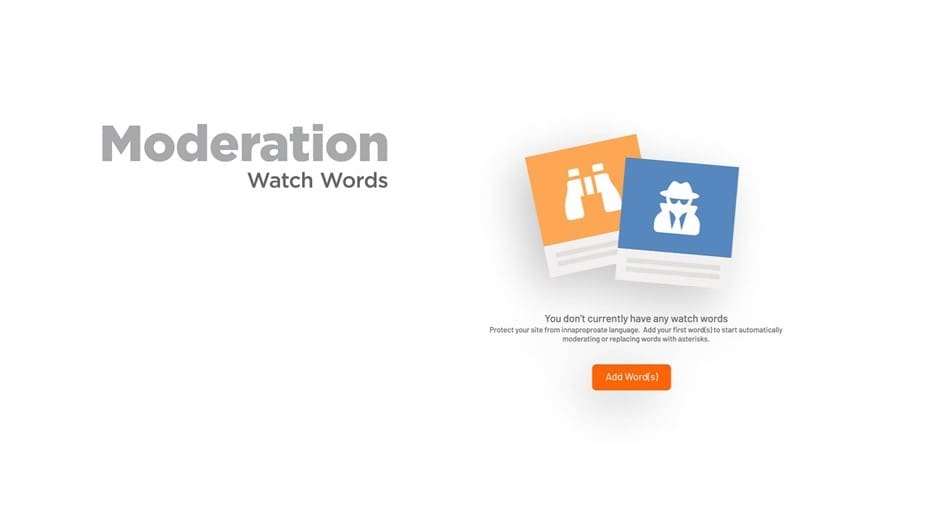
7 Do’s and Don’ts of Online Community Moderation
Moderating your online community is a big part of online community building – and with these best practices to guide your planning and preparation, you can master the skill.
Online community moderation is an aspect of online community building that might seem obvious – but in reality, it requires some planning, perspective, and patience. Without preparation, something as simple as moderating your community can turn into a huge headache.
While this won’t be a complete look at creating an online community moderation process, these are some 201-level moderation best practices to help you when you have to make difficult decisions.
A large part of becoming a good moderator is knowing how to strike the balance between controlling conversations to maintain order and stay on topic, contributing to make sure conversations continue and your members feel seen, and giving your community members free reign to express themselves. You don’t want mayhem, but you don’t want to dampen discussions before they get going.
Want to dig deeper? Check out our complete guide to online community.
Even though having to make moderation decisions is hard, it’s easier if you have a plan. Be prepared to act swiftly according to the established plan when dealing with issues in your moderation queue. Remember, with the right plan in place, your community’s most opinionated voices can sometimes become your best promoters.
Let’s dive into these best practice do’s and don’ts of online community moderation:
1. Do: Review Your Community Guidelines
A robust community Terms and Conditions or community guidelines document is a pillar for every online community. The guide should:
- Educate your online community members about community and how to monitor themselves and others. It shouldn’t be just a list of rules to follow.
- Clearly state expected behaviors as well as behaviors you don’t want to see. In that vein, define who the community is for and not for.
- Make this document easy to find and have on hand for all members – it should be a valuable resource for both new members learning the ropes and seasoned members who need a refresh.
As community manager, it’s your job to know these guidelines inside and out. It’s important you know what behavior is and is not constructive. If there are breaches in the code of conduct, you need to easily spot them, so they’re addressed swiftly and professionally. We recommend using a three-strike rule.
The community guidelines are in place to help you keep unhelpful or unproductive content away. If a member asks why their post was rejected, the community manager can always point out that the content goes against the stated community guidelines. When this type of situation happens, let the member know they can always rewrite the post to fit the guidelines and resubmit.

In Higher Logic Vanilla and Higher Logic Thrive, you can rely on tools in the online community like Watch Words to automatically flag and manage language deemed inappropriate, insensitive, or incendiary. We also help you moderate the community with three levels of moderation – full, self, and no moderation, giving you the flexibility your unique online community needs.
2. Don’t: Forget Debate is Good
Remember that debate and tension are a sign of community maturity and trust, so don’t rush in and shut down a discussion just because it’s getting tense. That’s where the learning and sharing can happen. Differing opinions and debate make a community more lively, engaging, and worthwhile for everyone.
In preparation for conversations on the community that become more heated and not productive, it’s helpful to have a list on hand of experts from your organization who you can tap to jump in and provide clarity and answers around the topic at hand.
3. Do: Deal with Trolls
It’s important to differentiate between someone who is toxic and someone who is angry. The angry member may have a valid point that needs to be addressed and their input and continued engagement is valuable. The toxic member is one that continually practices divisive behavior. It’s these trolls that need to be dealt with quickly and efficiently. All it takes is one or two trolls to take down an entire community. If that happens to you:
- Reach out to the problem member privately to see if there are any specific issues you can help with. This is a great opportunity to tap into your “expert list” to get the answers this member is looking for.
- Other community members need to know that you will take action to ensure the community remains a place of open collaboration and engagement. Consider posting (or reposting) moderation guidelines as an announcement in areas affected by the toxic member, reminding people of the rules.
- If toxic users continue to lash out, don’t be afraid to revoke their posting permissions. Your online community software should make it easy for you to control who can post to forums, publish blogs, and connect with other community members. Use your security settings and permissions and your three-strike system to control the situation.
4. Don’t: Ignore Feedback
Feedback is an opportunity to build customer loyalty and deepen trust. Perhaps every organization’s worst fear is having customer criticism front and center in a public place. Odds are that you’ll eventually get negative feedback in your community. And that’s okay (and even good)!
In fact, negative comments are usually a great opportunity for an organization to demonstrate transparency and a culture of openness in a controlled area, rather than in places like Facebook, LinkedIn, or G2 reviews where you have less control and/or visibility. It’s also a great opportunity to help determine your community roadmap and make plans to remediate the issue in the future.
When it’s a complaint in your community, you have direct access to the individual and the problem, so you can address it immediately. Rather than moderate, make your user feel heard.
This is also a situation where you might see that community members will come to your defense or offer up solutions when a user is complaining. So while it may feel uncomfortable, let the comment sit for a while before jumping in with an official response.
5. Do: Moderate Posts that Hinder Community Discussion
Certain posts can make it more challenging to interact with your community, whether that’s because it’s not real (in a spam situation) or because it doesn’t encourage or facilitate community discussion (we’ve all been there for long-winded, rambling posts that go nowhere). You should moderate:
- Spam: Chances are you do not run an online community for the Illuminati, so if you see a post advertising entrance, you can easily identify it as coming from an account that is a bot. Other times, spam isn’t as obvious. Checking the post against your community guidelines or looking to see if there are any hidden links in the post can help identify if it is spam. Make sure to reject and disable the account to prevent future spam from being posted.
- Promotional posts: This could include vendors or partners soliciting and/or commercial posts that do not facilitate conversations. This is a potential opportunity to reach out to the poster, let them know the post in its current state violates the guidelines and invite them to edit and resubmit.
- Job promotions: Unless your community is strictly for job seekers, you should set aside a separate thread. If they are looking for a job in your organization, you can message them privately to pass along the appropriate contact info.
- General announcements: Create a dedicated thread, especially if it’s related to administrative work.
- Long-form posts: If you have a user that’s going into too much detail, ask them to write a guest blog post or other long-form engagement, rather than via a discussion thread in the community. This also a good teaching opportunity for the community manager to help our long-winded friends by sharing a “how to create an effective discussion thread” post.
- Thank you posts or personal messages: It can be easy to mix up direct messages and public posts. Show users who do this how they can reply directly to a sender so as not to clog up the community digest.
6. Don’t: Immediately Answer Every Question
It’s tempting to answer every question, especially if it’s been sitting unanswered for a few hours or — gasp — a couple days. Resist the urge! Answering every single question discourages members of the community from replying and sets a precedent for your community members to be inactive and passive. To facilitate active conversation, you need to let questions breathe. Rather than jump in right away…
- Wait. Someone may surprise you by chiming in.
- Reach out behind the scenes to respected community members and ask them to answer.
- Find people within your organization you can impersonate (with permission) to promote diversity of voices.
7. Do: Show Personality
Is your profile picture still a big grey circle? As the community manager, you’re the driving force. You (and your team) should let your personalities shine in your writing — write like you talk! — so you come across as more human, relatable, and just as much a member of the community as you are a member of your organization.
This doesn’t mean you should go posting photos of your last vacation or what you ate that day, but you can relax and be personable in your replies and questions, which is much more likely to build community. That’s the goal at the end of the day, right?
Moderate Your Online Community with Confidence
As your community grows, creating its own social norms and expectations, learn to trust your members. Heavier moderation may be key in the beginning, like impersonating people to encourage others to contribute and to make sure early posts set a precedent by adhering to community guidelines. But as you build momentum, hopefully, you won’t need to be so involved in every minute detail. And that’s ok!
It means that you did your job well – wrote an excellent guideline and modeled good behavior – and your community members can now keep valuable discussions alive and self-moderate unproductive behavior. As new people join the community, it’ll be easier for them to get up to speed, because the precedent for what content is acceptable has been set.
As you can see, all the burden shouldn’t fall on you, all the time. Part of being a good moderator is training your online community members to moderate discussions themselves (and formalizing this in a community super user program) and helping them set a great example for new community members. And once they start moderating, you know your community is on the right track – they’re finding value in the community and taking ownership of how it’s used.



